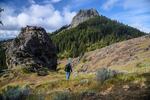
The Cascade-Siskiyou National Monument in Oregon.
Bob Wick/BLM
President Trump issued an executive order Wednesday that could foreshadow changes to two national monuments in Oregon and Washington.
Trump’s order calls for the secretary of interior to review several monuments with an eye toward changing them “back on track to manage our federal lands in accordance with traditional multiple use,” said Interior Secretary Ryan Zinke.
Zinke will develop recommendations for monuments to be rescinded, resized or modified — actions which would likely face legal challenges by environmental groups.
The order applies to monuments that were designated or expanded since 1996 to encompass 100,000 acres or more of federal land.
There are four total national monuments in Oregon and three in Washington, but under the order's criteria, only two of those protected areas could face changes. The Hanford National Monument in Washington state is on the list for review. The Cascade-Siskiyou National Monument in Southwest Oregon is not on that initial list, but it fits the president's criteria for monuments that warrant review — leaving Cascade-Siskiyou still open for future changes.
Zinke said in a press conference Tuesday that he'll be reviewing between 24 and 40 designations, with an eye toward "legislative changes of modifications to those monuments."
Included on the Interior Department's initial list of 24 monuments is the Hanford National Monument, created in 2000 by President Clinton.
Related: Ranchers And Loggers Dismayed At Cascade-Siskiyou Monument Expansion
The area near Richland, Washington, consists of 194,451 acres of premier wildlife habitat. The vast, desert sage-steppe is home to a number of wildlife species including bald eagles, elk, porcupine and beavers.
"It's a wonderful area," said 82-year-old Rich Steel of Richland, who advocated for conservation of the Hanford area for decades. "It has a lot of recreation, but it's not too crowded. It's one of those areas you'll never forget."
The protected area also includes a portion of the Columbia River known as the Hanford Reach, the only free-flowing freshwater section of the river. The reach includes vital migration and spawning habitat for threatened salmon species like spring Chinook and steelhead. It's also an important area to the Yakima Tribes, home to extensive cultural resources, rare food and medicinal plants.
Trump's order was cheered by Oregon Rep. Greg Walden.
“In Oregon, we’ve watched the problems left behind in the wake of national monument designations that lock up land without meaningful public input,” the Oregon Republican wrote in a statement Wednesday. “A review of the Antiquities Act is long overdue. I’m pleased that President Trump has finally ordered one."
Walden said Trump's order shows "farmers, ranchers, and local residents in Oregon," are finally being heard by the president's office.
The Antiquities Act of 1906 gives the president executive authority to designate national monuments without congressional approval, and without necessarily consulting local residents. The act has been used by both Republican and Democratic administrations to preserve public lands and marine areas, although President Obama established more national monuments than any other president in American history.
Zinke said Tuesday the executive process can leave out local residents who live near monuments.
“And that's why the president is asking for a review of the monuments designated in the last 20 years to see what changes, if any, improvements can be made, and give states and local communities a meaningful voice in the process,” he said.
Related: Timber Industry May Challenge Cascade-Siskiyou Monument Expansion
But in many recent cases, presidents have looked to local meetings and support as a gauge for whether to move forward with a national monument designation.
For instance, after local groups in Malheur County, Oregon, organized fierce opposition to a proposed monument designation of the Owyhee Canyonlands, Obama chose not to create a monument in that part of southeast Oregon.
On the opposite side of the state, there was more visible public support for the expansion of the the Cascade-Siskiyou National Monument, said Dave Willis, chair of the Soda Mountain Wilderness Council.
"I would say four public hearings and a one-month comment period was plenty of public input, especially when the Antiquities Act doesn't require any public input at all," Willis said.
Obama expanded the existing Cascade-Siskiyou from 65,000 acres to 113,000 acres. The expansion consists of old growth forest, meadows and wild rivers, and is some of the most diverse habitat in the region.
But the expansion was criticized by ranchers and the timber industry, who said the move would have crippling effects on the local economy. Some ranchers are hopeful that the Cascade-Siskiyou will be included in Zinke's review, and that Obama's expansion will be rolled back.
"This would help bring justice to these Oregon ranchers and farmers that are negatively impacted by this rash decision by President Obama," said Jerome Rosa with the Oregon Cattlemen's Association. "We feel it was an attempt to leave a personal and environmental legacy that was not fair and just."
Secretary Zinke indicated that Trump's order could include monuments like the Cascade-Siskiyou, that were modified in recent years.
"If the modification was significant, we'll look at that," Zinke said. "My understanding is there's about 30 or so monuments that fall into the category of 100,000 acres or larger and the modification was significant."
The original Cascade-Siskiyou Monument was created by President Clinton six months before he left office, and conservationists like Willis fear it could become a target for the administration.
"This review is unnecessary and it looks like the beginning of a slippery slope of the Trump administration trying to road and erode and log and drill America's public lands," said Willis. "And that's absolutely the wrong way to go."
